De Vlaamse schrijver Stefan Brijs werd geboren op 29 december 1969 in Genk. Zie ook alle tags voor Stefan Brijs op dit blog.
Uit: Maan en zon
“En je das recht hangen, Max. Never forget you’ tie.’
Max droeg al een eeuwigheid geen das meer. ‘Doe ik, pai.’
Roy vond het een goed idee. Hij begreep zijn zoon als geen ander. Alles voor de Dodge. En dat Max daarvoor helemaal naar Nederland zou vliegen, riep geen vragen bij hem op. In zijn oude hoofd lag het koninkrijk vast niet veel verder dan Aruba, waar hij een deel van zijn leven had doorgebracht en tijdens de Tweede Wereldoorlog het Amerikaans-Engels had opgepikt waarmee hij zijn zinnen kruidde.
Lucia, de vrouw van Max, had zich vreselijk opgewonden toen hij haar op de hoogte bracht van zijn plannen.
‘Naar Nederland? Voor oud ijzer? Ben je nog wel goed bij je hoofd? Laat die rotzooi per post komen!’
‘De douane steelt alles, Lucia, het zijn gangsters.’
‘En wie gaat dat betalen?’
‘Ik heb gespaard.’
‘Je hebt gespaard voor Sonny! Voor zijn studie! Niet voor dat wrak!’
‘Dat wrak zorgt wel voor brood op de plank. Als ik hem niet opknap dan hebben we straks niets meer. Niets!’
‘En toch ga je niet naar Nederland. Mi morto akibou!’ Over mijn lijk!
‘Toen heb ik me omgedraaid en ben weggelopen. Met veel pijn in mijn hart.’ Dat vertelde Max aan mij. Hij legde zijn grote hand op zijn borst. ‘Ik hou van haar. Zij is mijn alles. Zij en Sonny. Luna ku solo. Wil je dat tegen haar zeggen zodra ik weg ben? Dat zij de maan is die mijn donkere nachten verlicht.’
De gevoelige ziel van Max. Innerlijk kan hij niet méér verschillen van zijn vader. Zijn krachtige fysieke verschijning heeft hij wel van hem geërfd. Het lichaam van Roy raakte echter al vroeg door reuma verteerd. Zijn vingers, zijn tenen, zijn handen en voeten, rug en nek, alles aan hem is mettertijd kromgetrokken, zijn staalkabels van spieren zijn vezel per vezel geknapt, de gewrichten vergroeid tot knobbels die zijn huid zo oprekken dat die er bleek van is geworden.”
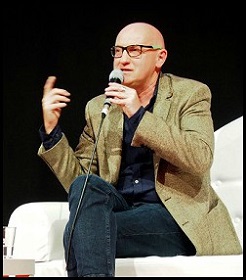
Stefan Brijs (Genk, 29 december 1969)
De Zwitserse schrijver en journalist Christian Kracht werd geboren in Saanen op 29 december 1966. Zie ook alle tags voor Christiab Ktacht op dit blog.
Uit: Faserland
“Also, es fängt damit an, daß ich bei Fisch-Gosch in List auf Sylt stehe und ein Jever aus der Flasche trinke. Fisch-Gosch, das ist eine Fischbude, die deswegen so berühmt ist, weil sie die nördlichste Fischbude Deutschlands ist. Am obersten Zipfel von Sylt steht sie, direkt am Meer, und man denkt, da käme jetzt eine Grenze, aber in Wirklichkeit ist da bloß eine Fischbude.
Also, ich stehe da bei Gosch und trinke ein Jever. Weil es ein bißchen kalt ist und Westwind weht, trage ich eine Barbourjacke mit Innenfutter. Ich esse inzwischen die zweite Portion Scampis mit Knoblauchsoße, obwohl mir nach der ersten schon schlecht war. Der Himmel ist blau. Ab und zu schiebt sich eine dicke Wolke vor die Sonne. Vorhin hab ich Karin wiedergetroffen.
Wir kennen uns noch aus Salem, obwohl wir damals nicht miteinander geredet haben, und ich hab sie ein paar mal im Traxx in Hamburg gesehen und im P1 in München.
Karin sieht eigentlich ganz gut aus, mit ihrem blonden Pagenkopf. Bißchen zuviel Gold an den Fingern für meinen Geschmack. Obwohl, so wie sie lacht, wie sie das Haar aus dem Nacken wirft und sich leicht nach hinten lehnt, ist sie sicher gut im Bett. Außerdem hat sie mindestens schon zwei Gläser Chablis getrunken. Karin studiert BWL in München. Das erzählt sie wenigstens. Genau kann man sowas ja nicht wissen. Sie trägt auch eine Barbourjacke, allerdings eine blaue. Eben, als wir über Barbourjacken sprachen, hat sie gesagt, sie wolle sich keine grüne kaufen, weil die blauen schöner aussehen, wenn sie abgewetzt sind. Das glaube ich aber nicht. Meine grüne Barbour gefällt mir besser. Abgewetzte Barbourjacken, das führt zu nichts. Das erkläre ich später, was ich damit meine.“
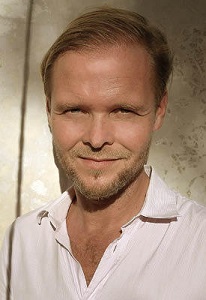
Christian Kracht (Saanen, 29 december 1966)
De Britse schrijver, filmcriticus en columnist Gilbert Adair werd geboren op 29 december 1944 in Edinburgh. Zie ook alle tags voor Gilbert Adair op dit blog.
Uit:The Real Tadzio
“Even now, nearly a century after the event, it is not generally realised, save to specialists of Mann’s work and life, that virtually everything experienced by Gustav von Aschenbach in the novella, short of his premature death on the beach, had first happened to the author. Yet Mann never sought to camouflage just how little of a novelist’s imaginative gifts had gone into this particular tale. More than once he admitted to the world that there really had been an effeminate, posturing fop, a gruff gondolier, an aristocratic Polish family and, of course, a beautiful boy. As he himself wrote:
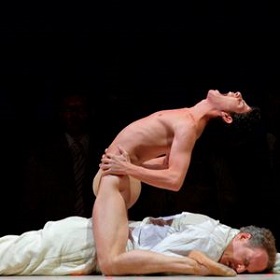
Filipe Pinheiro als Tadzio en Kurt Streit als Gustav von Aschenbach in een scene van de opera ‘‘Death in Venice’’ van Benjamin Britten, Wenen, 2009
“Nothing is invented in Death in Venice. The ‘pilgrim’ at the North Cemetery, the dreary Pola boat, the grey-haired rake, the sinister gondolier, Tadzio and his family, the journey interrupted by a mistake about the luggage, the cholera, the upright clerk at the travel bureau, the rascally ballad singer, all that and anything else you like, they were all there. I had only to arrange them when they showed at once and in the oddest way their capacity as elements of composition.”
Yet, surprisingly, in that self-same year of 1912, Mann was complaining of the novella’s “errors and weaknesses” and describing it to his brother Heinrich as “full of half-baked ideas and falsehoods”. Had he been afforded the opportunity of writing Death in Venice over again, Thomas insisted, he would have made it significantly less of a “mystification”. And, indeed, as we have long known, the reality is that, notwithstanding his claims to the contrary – that the novella’s narrative had simply and magically unfolded before his eyes and that all he had had to do was transcribe it from life, as though taking dictation from God – he had been as economical with the factual truth as the majority of his fellow-novelists.”
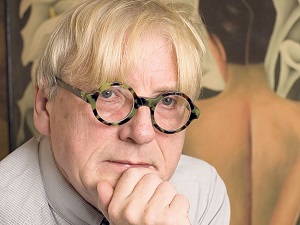
Gilbert Adair (29 december 1944 – 8 december 2011)
Cover Italiaanse uitgave van “The Real Tadzio”
De Duitse schrijfster Brigitte Kronauer werd geboren op 29 december 1940 in Essen. Zie ook alle tags voor Brigitte Kronauer op dit blog.
Uit: Poesie und Natur/Natur und Poesie
„Vor zwei Monaten, am 2. April 2011, nach einem ungewohnt langen nördlichen Winter, sah ich beim Frühstück kurz von meiner Zeitungslektüre auf und, zunächst ohne zu stutzen, durch das Küchenfenster. Dann vertiefte ich mich wieder in die Hauptnachrichten zum damals akuten Weltzustand, also zu den Bemühungen, die japanische Atomkatastrophe zu begrenzen, zum Waffenstillstandsangebot der libyschen Aufständischen und dessen Ablehnung durch Gaddafi , und,
lediglich eine innerdeutsche Affäre, zum Rückzug des Außenministers
Westerwelle vom Parteivorsitz der FDP. Erst dann, nach Kenntnisnahme einer Anzeige des Bayerischen Rundfunks zur Übertragung der Oper Anna Bolena aus der Wiener Staatsoper, wurde mir plötzlich bewußt, daß ich eben etwas Außergewöhnliches aufgenommen, allerdings nicht im geringsten begriffen hatte.
Wie gesagt, diesem Augenblick waren viele stumme, geruchlose, unbewegte Wochen vorausgegangen. Als ich zum zweiten Mal nach draußen zur leicht frostigen, in blendender Helligkeit daliegenden Wiese sah, mit den wegen Unbelaubtheit scharfen Schlagschatten der Obstbäume darauf, kurzum die allererste optische Frühlingssensation konstatierte, die mir mit Verzögerung nun aber doch kurzfristig samt »Ah« und »Oh« den Atem verschlug, packte mich umgehend eine mir im Prinzip wohlvertraute Unruhe. Es war der energische, geradezu verbissene Wunsch zu formulieren, was ich wahrnahm, die Färbung und neuartige Beleuchtung, die komplette, nervös vibrierende Erscheinung in Wörtern festzuhalten und mich gleichzeitig ihres starken Appells zu entledigen.
Es hätte im Prinzip auch die bequeme Möglichkeit bestanden, meine Beobachtung in schon bestehende, von anderen geschriebene Zeilen einmünden zu lassen. Allerdings fi el mir so schnell nur Goethes »Mailied« ein. Von dessen genialisch drängendem Dreischritt »Es dringen Blüten aus jedem
Zweig / Und tausend Stimmen aus dem Gesträuch / Und Freud und Wonne aus jeder Brust« konnte an diesem spröden Aprilmorgen nicht die Rede sein. Etwas anderes aber hatte mein Gedächtnis gerade nicht zur Hand.“
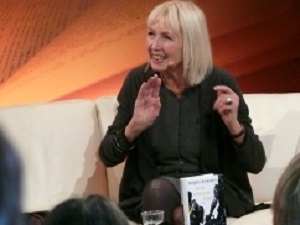
Brigitte Kronauer (Essen, 29 december 1940)
De Amerikaanse schrijver Paul M. Rudnick werd geboren op 29 december 1957 in Piscataway, een voorstad van New York. Zie ook alle tags voor Paul Rudnick op dit blog.
Uit:Valhalla
“SALLY: Some people think that I had—feelings for James Avery, but that is just not true. But before he—went away, he always used to say something which I will never forget. He would say that he’d been studying the situation since kindergarten, and that he’d made lists and charts and held a personal pageant, and that he had finally determined that I was the prettiest girl in all of Dainsville. And he said that the prettiest girl can give people hope, and brighten their day, and wasn’t that just a wonderful thing to say? Especially for a delinquent? And ever since then, whenever I look in the mirror, I see Eleanor Roosevelt. Only, of course, pretty. I mean, Mrs. Roosevelt works so hard, trying to help the poor and the downtrodden, but can you imagine how much more she could do, if she were pretty? And of course, there’s also inner beauty, but inner beauty is tricky, because you can’t prove it. I’ve thought a lot about this, you know, about beauty and goodness, and all the different religions? I mean, Buddha is chubby—face it. And Confucius was all old and scraggly and, I imagine, single. And you’re not even allowed to have a picture of Mohammed—was it the teeth? I don’t know. But Jesus is always really pretty, with perfect skin and shiny hair, it’s like God was saying, look to Jesus, for tips. And I don’t want to be vain or prideful, so I always remember what James said, in one of his letters. He said that there are only two things which really matter in life: youth and beauty.”
(James enters, dressed as he was in the locker room. He is on the prowl, stalking Sally. She’s frightened, nervous and very drawn to James.)
JAMES: Truth and beauty.
SALLY: James? Oh my God!
JAMES: The front door was open.
SALLYIs that really you? Ate you back?
JAMES: For the day.
SALLY: Look at you, you look, well, I’m not even sure what to say, you look — older. Rougher. But what are you doing here?
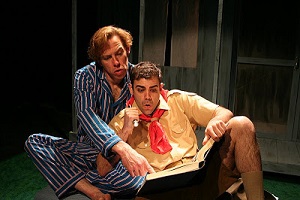
Paul Rudnick (Piscataway, 29 december 1957)
Scene uit een opvoering in Boston, 2007
De Amerikaanse schrijver William Gaddis werd op 29 december 1922 geboren in New York. Zie ook alle tags voor William Gaddis op dit blog.
Uit: Carpenter’s Gothic
“The bird, a pigeon was it? or a dove (she’d found there were doves here) flew through the air, its colour lost in what light remained. It might have been the wad of rag she’d taken it for at first glance, flung at the smallest of the boys out there wiping mud from his cheek where it hit him, catching it up by a wing to fling it back where one of them now with a broken branch for a bat hit it high over a bough caught and flung back and hit again into a swirl of leaves, into a puddle from rain the night before, a kind of battered shuttlecock moulting in a flurry at each blow, hit into the yellow dead end sign on the corner opposite the house where they’d end up that time of day.
When the telephone rang she’d already turned away, catching breath, and going for it in the kitchen she looked up to the clock: not yet five. Had it stopped? The day was gone with the sun dropped behind the mountain, or what passed for one here rising up from the river. —Hello? she said, —who…? Oh yes no, no he’s not here he’s… No I’m not, no.
No, I’m… Well I’m not his wife no, I just told you. My name is Booth, I don’t even know him. We’ve just… Well if you’ll just let me finish! We’ve just rented his house here, I don’t know where Mister McCandless is I’ve never even met him. We got a card from him from Argentina that’s all, Rio? Isn’t that Argentina? No it was just a card, just something about the furnace here it was just a postcard. I’m sorry I can’t help you, there’s somebody at the… No I have to go goodbye, there’s spmebody at the door…
Somebody hunched down, peering in where she’d stood staring out there a minute before, a line straight through from the kitchen past the newel to the front door fitted with glass, shuddering open. —Wait! she was up, —wait stop, who…
—Bibb?
—Oh. You frightened me.
He was inside now, urging the door closed behind him with his weight against it, bearing up her embrace there without returning it. —Sorry, I didn’t…”
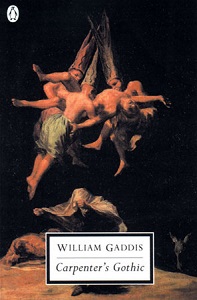
William Gaddis (29 december 1922 – 16 december 1998)
Cover
De Duitse dichteres en schrijfster Carmen Sylva werd geboren op 29 december 1843 in Neuwied als prinses Pauline Elisabeth Ottilie Luise zu Wied. Zie ook alle tags voor Carmen Sylva op dit blog.
Wind
Der Baum ist die Leyer,
Der Sänger der Wind,
Er weiß sie zu spielen,
Bald stark und bald lind.
Er singet Balladen,
Er schmeichelt, er preist,
Erzählt, wie er sieghaft
Die Welt hat umkreist.
Es flüstert die Leyer,
Sie braust und sie weint,
Und hat mit den Liedern
Ihr Tönen vereint.
Und unten der Wildbach
Wird rasend und schäumt
Die fliehende Wolke
Kommt näher und träumt.
Die Gräser und Blumen
Verneigen sich sacht,
Der Felsen giebt Antwort,
Auch er ist erwacht.
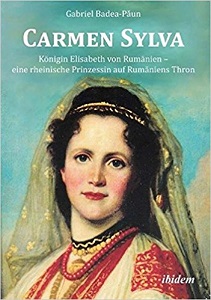
Carmen Sylva (29 december 1843 – 2 maart 1916)
Cover
Onafhankelijk van geboortedata:
De Duitse dichteres Vesna Lubina werd geboren in 1981 als dochter van Bosnische immigranten in Witten. Zie ook alle tags voor Vesna Lubina op dit blog.
unternehmungen im bedeutungslosen leben
wir werden uns wiederfinden. auf augenhöhe werden wir
auf einander treffen und in die arme fallen, die hand geben,
auf ein von beiden parteien unterschriebenes dokument verweisen.
wir teilen die höhe des mietbetrags durch zwei, unter umständen
gelingt das nicht jeden monat. wir werden dann aufgaben finden,
rollen annehmen, auch jene die uns nicht ganz passen
oder zustehen.
wir gehen dorthin, wo keine konkurrenz besteht.
wo man einen beim wort nimmt (auch dem wollen manche entrinnen),
wo nachbarn unter einander brennholz tauschen (eiche brennt am längsten)
und den rest für sich behalten. and the rest shall remain unsold.
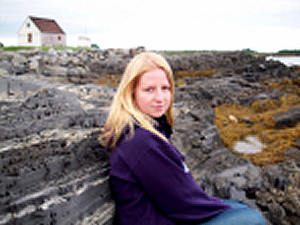
Vesna Lubina (Witten, 1981)
Zie voor nog meer schrijvers van de 29e december ook mijn blog van 29 december 2012.
